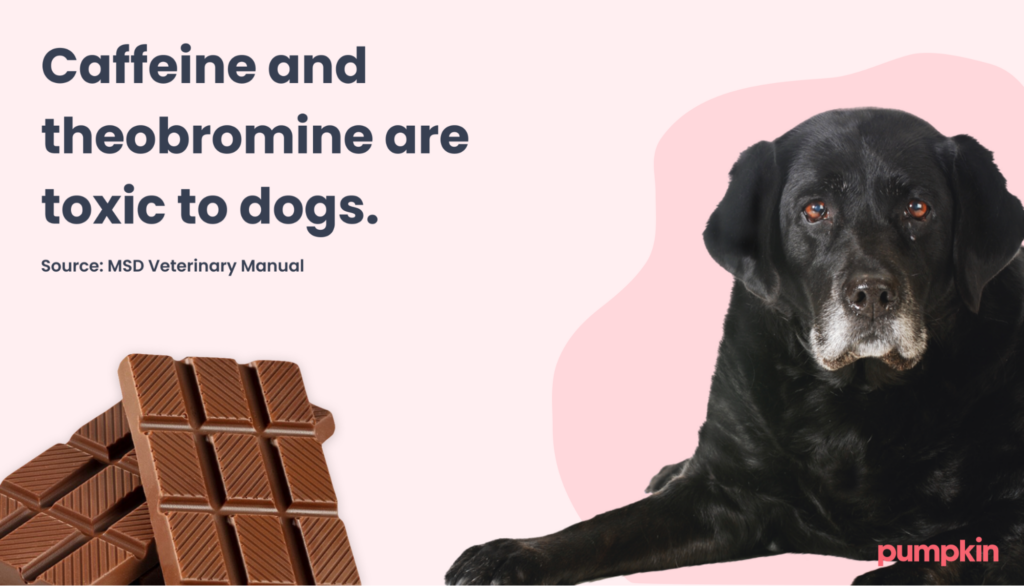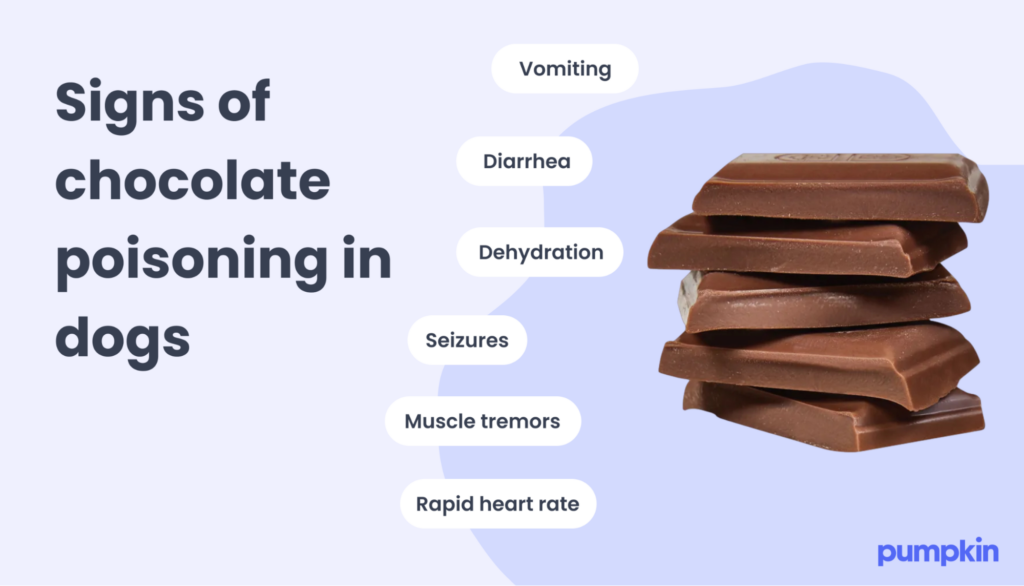Key Points:
- Despite potential health benefits for humans, chocolate poses serious risks to dogs.
- Dogs should never eat chocolate as it contains theobromine and caffeine, which are toxic for them.
- Chocolate poisoning can lead to symptoms such as vomiting, diarrhea, dehydration, excessive thirst, frequent urination, muscle tremors, and seizures.
If you have a sweet tooth, you may crave chocolate when you need a pick-me-up. It could be your go-to snack for movie nights or something you grab to cure a bout of the ‘hangries.’
For most humans, there’s nothing wrong with eating chocolate in moderation. But can dogs eat chocolate too?
We’re hoping you already know that the answer is always an emphatic no. Chocolate isn’t safe for dogs or cats, and even a small amount can have serious consequences. While it’s rare for chocolate poisoning to become fatal in our pets, it can happen in extreme cases.
In this guide, you’ll learn why chocolate isn’t safe for dogs, the common symptoms and treatment for chocolate toxicity, and what to do if your dog steals some chocolate from the counter.
Why is chocolate bad for dogs?
Dogs can’t eat chocolate because it contains theobromine and caffeine — ingredients from the methylxanthine family.
While humans can process these easily, in dogs, methylxanthines can lead to chocolate poisoning.
Theobromine
Theobromine is found in cocoa beans and can be lethal to pups. It affects their nervous system, cardiovascular system, and respiratory system.
It also has a diuretic effect, meaning it increases the loss of water and salt in the body. In severe cases, this ingredient can quickly bring on theobromine poisoning. Symptoms include vomiting, restlessness, and diarrhea.
Dark chocolate contains the most cocoa, so the risk of theobromine poisoning will be higher than in less bitter chocolate varieties.
Caffeine
Chocolate also contains caffeine, a strong stimulant also found in coffee and energy drinks. It stimulates the brain and central nervous system. (It’s also why dark chocolate can be an effective appetite suppressant.)
Human bodies can handle large amounts of caffeine — even if it causes some caffeine jitters — but dogs will struggle with even a small amount.
Caffeine can negatively impact your dog’s nervous system and heart rate. They may also lose muscle control and have seizures or tremors.

High fat content
Because the average milk chocolate bar has a high fat content, pups who ingest chocolate may also be at risk of developing pancreatitis. Pancreatitis can cause symptoms like:
- Diminished appetite
- Abdominal pain
- Vomiting and diarrhea
The likelihood of pancreatitis can depend on your dog’s size and the amount of fatty foods they consume.
The type of chocolate your dog eats, the amount, and their age and size will all impact how seriously it will affect them.
It’s important to keep an eye out when your dog is around anything containing chocolate. And you should take immediate action if you suspect your dog has ingested any of this sweet treat.
How much chocolate can dogs eat?
The seriousness of chocolate poisoning in dogs depends on how much they consume relative to their body weight. An online chocolate toxicity calculator for dogs can help you find out how urgently a vet visit is needed.
A trace amount of chocolate isn’t usually a cause for concern. So, if your dog licks a chocolate cake crumb or eats one semi-sweet chocolate morsel, they should be okay.
It’s still wise to be extra careful, though. While one chocolate chip may be nothing to a large dog, it could cause big issues for a small one. It’s best to avoid chocolate altogether and be as safe as you can, as even one bite of chocolate may pose a risk to your pet’s health.
Unfortunately, because dogs can sometimes tolerate small amounts of chocolate, some pet owners come to the false conclusion that chocolate is safe for dogs after all — a very dangerous conclusion.
This means it’s a huge no-no to give your dog a taste of any desserts containing chocolate, including cakes, cookies, muffins, pancakes, puddings, ice creams, breakfast bars, brownies, and pastries.
Help, my dog ate chocolate — now what?
If you know your dog has eaten chocolate, you should give your vet a call. You will need to provide some information, including:
- The type of chocolate your dog ate: Dark chocolate, milk chocolate, or white chocolate
- The amount of chocolate your dog ate: How many pieces or bars
- The size of your dog: How many pounds they weigh and their breed
These details will help the vet give you the right advice. For example, if your Labrador Retriever has eaten one piece of chocolate, they probably won’t need to go to the vet right away. On the other hand, a Toy Poodle may need an emergency appointment.
When you live with a curious pup, accidents happen, and having a pet insurance plan in place can often help. With a Pumpkin pet insurance policy, you can reduce the cost of eligible veterinary expenses in the future. This means you can get your dog the help they need in an emergency without worrying too much about cost.
What are the symptoms of chocolate poisoning?
If your dog eats chocolate, watch out for signs of chocolate poisoning. Common symptoms include:
- Vomiting
- Diarrhea
- Dehydration (excessive thirst)
- Frequent urination
- Drooling
- Restlessness
- Higher than usual heart rate
- Seizures
- Muscle tremors

Remember, dogs absorb theobromine slowly, so symptoms may not show up right away. It could take up to 24 hours after ingestion for side effects to appear.
How is chocolate poisoning treated?
Treatment for chocolate toxicity will depend on the amount your dog ate and how long it’s been since ingestion. Your veterinarian may induce vomiting and give your dog activated charcoal to prevent further theobromine absorption. Remember: You should never try to make your dog throw up at home.
In serious cases, a vet may administer intravenous (IV) fluid therapy to deliver medication directly into your dog’s bloodstream. Depending on symptoms, they may also give your dog heart medication.
If you’re not sure what to do, you can also call ASPCA Animal Poison Control at (888) 426-4435, which is open 24 hours a day. They can help you decide what to do next.
Remember, if your pet has ingested a toxic amount of chocolate, they’ll need treatment as soon as possible. The faster you act, the better your pup’s outcome will likely be.
What other foods are toxic for dogs?
Chocolate isn’t the only food on the “do not eat” list for dogs. There are other human foods you should avoid feeding your pet, such as:
While these foods are toxic to dogs, there are plenty of safe alternatives you can share with your canine companion instead. Many common fruits, vegetables, and meats can be served to your dog in moderation.
The bottom line: Keep chocolate away from your pup!
There is no doubt your pup would enjoy the taste of chocolate, but this doesn’t mean it’s good for them. Chocolate is toxic to dogs, and if they eat too much, it can be life-threatening.
The ingredients found in chocolate are fine for humans, but dogs can’t digest them properly. The culprits are theobromine and caffeine, which can both cause poisoning in pets.
If you think your dog has eaten chocolate, there is no time to wait. Check in with your vet to discuss chocolate toxicity symptoms and treatment or visit an animal hospital for urgent help.
FAQs
- https://www.msdvetmanual.com/toxicology/food-hazards/chocolate-toxicosis-in-animals
- https://www.sciencedirect.com/topics/biochemistry-genetics-and-molecular-biology/theobromine
- https://pmc.ncbi.nlm.nih.gov/articles/PMC9589144/#sec4
- https://vcahospitals.com/know-your-pet/caffeine-toxicity-in-pets
- https://aercmn.com/understanding-caffeine-toxicity-in-pets/
- https://www.msdvetmanual.com/multimedia/clinical-calculator/chocolate-toxicity-calculator
- https://vcahospitals.com/know-your-pet/chocolate-poisoning-in-dogs
- https://www.aspca.org/pet-care/animal-poison-control
- https://pmc.ncbi.nlm.nih.gov/articles/PMC6254055/
- https://www.researchgate.net/publication/350523836_Chocolate_ingestion_in_156_dogs
- https://www.wiggleworthy.com/easy-gluten-free-carob-dog-birthday-cake.html




